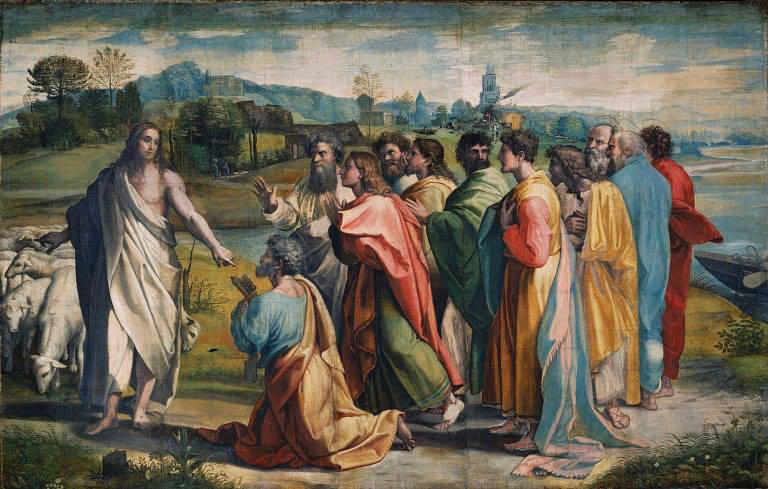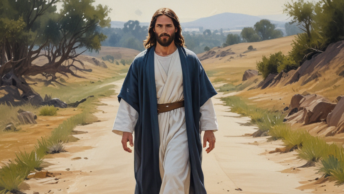Some years ago a group of rabbis were meeting to study and discuss the Talmud, the Jewish book of commentaries on Scripture and the Law of Moses. One of them suggested they take a break, and offered to pay for refreshments—if someone else would go out to a nearby store and purchase them. However, no one volunteered—so finally the oldest rabbi said, “Give me the money; I have a young boy who will be glad to go.” He disappeared for a while, and when he returned with the refreshments, he was out of breath—so it was obvious he himself had gone to purchase the items. The others didn’t say anything, but it was evident they were confused and annoyed their colleague had lied to them. Noticing this, the rabbi said, “I didn’t mislead you at all. You see, many people outgrow their youth and become old men. I have never let the spirit of my youth depart. And as I grew older, I always took along with me the young boy I had been. It was that young boy in me who did the errand” (Gerard Fuller, Stories for All Seasons, p. 14).
There is indeed a certain sense in which we can be transformed or renewed by holding onto a youthful spirit. Children and young people can have some very natural and beautiful qualities or characteristics. Quite often, they’re filled with a sense of wonder and fascination when they see or encounter something new and interesting, especially when it’s directly part of nature and God’s creation. They’re curious and eager to learn; they can be happy to help their elders and to be included in the discussions and activities of others. Above all, they often approach life itself with gratitude and energy and enthusiasm—and these feelings can be quite contagious. For all these reasons, spending time with and getting to know children and young people can be an experience of joy and renewal, and a form of transformation allowing us to see and feel a happy side of ourselves that’s usually hidden and even forgotten. Just as Jesus showed the hidden side of Himself to three of His apostles, so we are called—with the help of God’s grace—to let our best selves emerge, thereby helping renew and change the world around us.
Jesus is truly and fully human, and truly and fully Divine. His apostles had seen only His human nature, though even then there was something about Him that helped them realize He was more than just an ordinary man. As part of His preparation for His upcoming passion and death, the Lord took the core group of the apostles—Peter, James, and John—to the top of Mount Tabor for them to see or witness the truth of His Divinity. This was intended to reassure them in the terrible days to come that everything was unfolding according to God’s plan of salvation, and that they themselves had an important role to play in that plan—a plan in which the power of sin and death would be destroyed, and everything be made spiritually new and beautiful and holy. However, there was a price to be paid. Jesus would have to undergo agony, rejection, condemnation, suffering, and death so that God’s creation might be restored and renewed.
This same process occurs in the lives of His followers. Just as the Lord summoned Abram to leave his homeland and journey to a new land—a radical, almost unthinkable step in ancient times—so He may call us to leave behind what we’ve known and instead go bravely in a new direction. Such change is not easy; that’s why St. Paul instructs us, “Bear your share of hardship for the Gospel with the strength that comes from God.” Children, despite their natural openness and curiosity, can easily be frightened or confused when they encounter something new and unknown and different—but if they’ve learned to trust the adults in their life, these new experiences can be eye-opening, reassuring, and enjoyable. In the same way, if we’ve learned to trust our heavenly Father, answering His call becomes not a burden, but a joy.
On one occasion when I was home from the seminary, I noticed the pastor of my home parish using incense at a liturgy, walking up the center aisle of church while swinging the thurible, or the container for the charcoal and incense, back and forth. A small boy of about three or four was watching in utter fascination, so Father stopped right next to him while continuing to use the incense. Afterwards I asked him about this, and he explained that childhood memories and experiences that enthrall us can subconsciously remain with and influence us for a lifetime—so he was taking the opportunity to create or implant a wonder-filled religious memory that might transform the direction of that child’s life. The Lord God seeks to do the same thing for each one of us.
Lent is an opportunity to slow down, think about what really matters in life and what values we wish to live by, and carve out some quiet time from our busy schedules to recognize and appreciate what the Lord is doing in our hearts and in the world around us. Following an unchanging daily routine, getting caught up in the so-called “rat race,” and focusing primarily on our daily duties and worldly responsibilities, can make us old before our times—certainly in a spiritual sense, and sometimes even in a physical one. We have to remember that oftentimes there is still a child hidden within us—a person capable of receiving and sharing love, experiencing wonder and awe, and of influencing others in a holy, playful, and sometimes mysterious way. God wants us to prepare for the beauty of Heaven by opening ourselves as fully as we can to the beauty of life here on earth—even when this involves some degree of hardship, suffering, and sorrow. If this seems difficult or unrealistic, we may need to ask ourselves, “How much do I really trust in my heavenly Father? Have I truly shared my fears and problems with Him? Am I genuinely open to the graces and spiritual resources He offers me through the Church?”
The apostles had to learn to see Jesus in a new way in order to be made ready for their mission in life—and once this fully happened through the Gifts of the Holy Spirit received on Pentecost Sunday, things were never again the same. We too can be filled with a youthful spirit of wisdom, wonder, and joy, letting the world see a new and grace-filled side of ourselves—if only we have the humility and trust to ask for this gift. Jesus promises, “Behold, I make all things new”—and if we allow this dynamic to be at work in our lives, we can experience a joy and a peace that remains with us forever.








